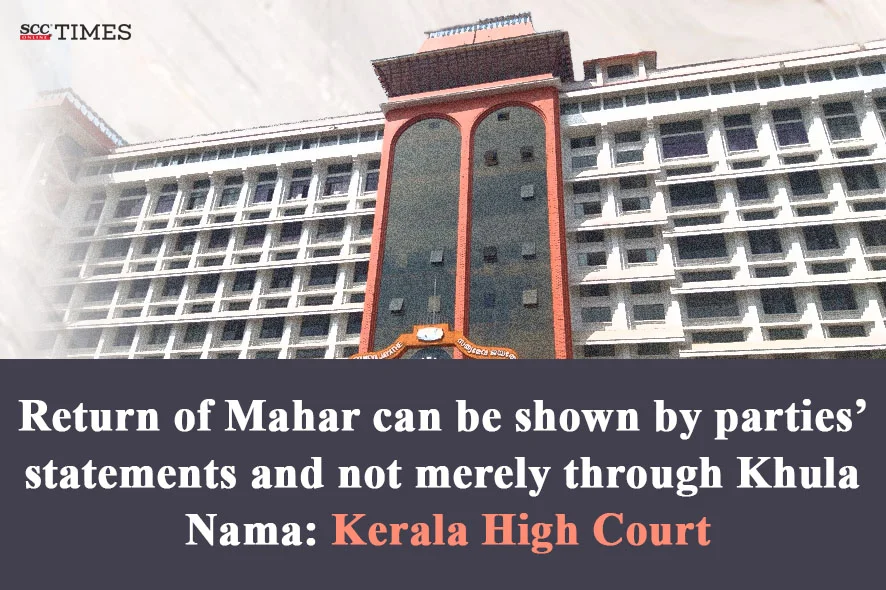Kerala High Court: In the present appeal, the appellant-husband challenged the divorce granted by the Family Court to the respondent-wife, arguing that there was no conciliation attempt between parties before the wife issued the Khula Nama and that the there was no mention of offer of return of Mahar in the Khula Nama.
The Division Bench of Devan Ramachandran* and M.B. Snehalatha, JJ., dismissed the appeal and observed that the return of Mahar could be ascertained not just from the Khula Nama but also from the statement of the parties made before the Family Court.
Background:
The parties got married on 15-12-2019 and had a son on 23-04-2021. A matrimonial strife germinated between them, and the wife issued a Khula Nama, dated 05-10-2023, to the husband, thus divorcing him. Thereupon, she filed a petition before the Family Court seeking declaration of her marital status as being divorced from the husband, which was allowed by the Family Court after recording her statement and evaluating documents produced by her.
The husband challenged the Family Court’s order stating that there was no conciliation between them before the Khula Nama was issued and that the wife did not offer to return the Mahar, which she conceded was received from him. He further argued that when he had filed the said objections before the Family Court, it could not have declared the divorce to be valid. He relied on Asbi v. Hashim M.U., 2021 SCC OnLine Ker 3945, and contended that though a detailed enquiry might not be necessary, the Family Court ought to have ascertained whether there was a valid pronouncement or declaration of Khula and whether it was preceded by an effective attempt at conciliation.
However, the wife’s counsel submitted that even when the Khula Nama was issued, the wife stated that there were attempts of reconciliation initiated by her and her family, but the husband did not accede to it, nor had he agreed to any viable settlement. Though the wife had conceded that Mahar was given to her, she stated that the same was taken away by the husband even before she issued the Khula Nama. He further submitted that the question whether there was an offer by the wife to return the Mahar was to be ascertained not merely from the recitals in the Khula Nama or his communication but could also be done through the recording of the parties’ statement.
Analysis and Decision:
The Court noted that the Khula Nama did not mention whether the Mahar, which the wife acknowledged, was returned, would be returned, or had been taken by the husband. However, in the petition before the Family Court, the wife had unequivocally stated that the Mahar of 10 sovereigns of gold had been taken away by the husband much before she issued the Khula Nama. She also mentioned the reconciliation efforts taken via mediation.
The Court further noted that though alerted by the wife’s pleadings and statement, the husband neither filed a proof affidavit, nor did he choose to offer his statement. The husband had pointed out that the mediators were the wife’s relatives, and therefore, the reconciliation was not proper. The Court opined that it virtually fortified the Family Court’s opinion that there were attempts of reconciliation, because if the husband had a case that the stated mediators were biased, nothing prevented him from filing an affidavit to such effect, or in giving his statement.
The Court agreed with the wife’s counsel regarding Mahar and relied on Asbi (supra) wherein the Court had declared three methods of assessment to be done by the Family Court. The first was by evaluating whether there was an offer by the wife to return the Mahar in the Khula Nama itself; second, whether it was so stated in the communication if issued; and finally, by recording the statement of the parties.
The Court opined that the wife’s statement that Mahar was taken away before she issued Khula Nama ought not to be accepted blindly, but the fact that the husband chose not to file his proof affidavit, or to offer statement, travels to establish the truth of the wife’s assertions. The Court observed that when the factum of an attempt of reconciliation and the absence of Mahar with the wife, was prima facie established, there was no reason to doubt, or to find error in the views of the Family Court.
The Court clarified that Asbi (supra) singularly declared that Khula was a mode of extra-judicial divorce and that the Family Court was only to verify whether the pronouncement of the same was done in a proper manner, and if it was preceded by an effective attempt of conciliation. The Court noted that in the present case, the attempt of conciliation proceedings before the issuance of Khula Nama had been established and the wife’s incapacity to return the Mahar also stood proved. The Court further observed that the endorsement of the extra-judicial divorce and the consequential declaration by the Family Court did not preclude the husband from challenging the divorce as per law, for which liberties were reserved in Asbi (supra).
Consequently, the Court dismissed the appeal and held that there was no cogent cause to find the Family Court’s judgment to be in any kind of error.
[Muhammed Ashar. K. v. Muhsina P.K., 2025 SCC OnLine Ker 11000, decided on 13-10-2025]
*Judgment authored by: Justice Devan Ramachandran
Advocates who appeared in this case:
For the Appellant: Muhammed Ashar. K (party-in-person), Advocate.
For the Respondents: T.P. Sajid, K.P. Mohamed Shafi, Shifa Latheef, Sreeshma B. Chandran, Muhammed Haroon A.N., Hasharurahiman U., Mohemed Favas, Advocates.


